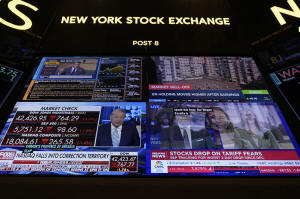Stocks' sell-off worsens as Wall Street wonders how much pain Trump will
accept for the economy
[March 11, 2025] By
STAN CHOE
NEW YORK (AP) — The U.S. stock market’s sell-off cut deeper on Monday as
Wall Street questioned how much pain President Donald Trump will let the
economy endure through tariffs and other policies in order to get what
he wants.
The S&P 500 dropped 2.7% to drag it close to 9% below its all-time high,
which was set just last month. At one point, the S&P 500 was down 3.6%
and on track for its worst day since 2022. That’s when the highest
inflation in generations was shredding budgets and raising worries about
a possible recession that ultimately never came.
The Dow Jones Industrial Average dropped 890 points, or 2.1%, after
paring an earlier loss of more than 1,100, while the Nasdaq composite
skidded by 4%.
It was the worst day yet in a scary stretch where the S&P 500 has swung
more than 1%, up or down, seven times in eight days because of Trump’s
on -and- off -again tariffs. The worry is that the whipsaw moves will
either hurt the economy directly or create enough uncertainty to drive
U.S. companies and consumers into an economy-freezing paralysis.
The economy has already given some signals of weakening, mostly through
surveys showing increased pessimism. And a widely followed collection of
real-time indicators compiled by the Federal Reserve Bank of Atlanta
suggests the U.S. economy may already be shrinking.
Asked over the weekend whether he was expecting a recession in 2025,
Trump told Fox News Channel: “I hate to predict things like that. There
is a period of transition because what we’re doing is very big. We’re
bringing wealth back to America. That’s a big thing.” He then added, “It
takes a little time. It takes a little time.”
Trump says he wants to bring manufacturing jobs back to the United
States, among other reasons he’s given for tariffs. His Treasury
secretary, Scott Bessent, has also said the economy may go through a
“detox” period as it weans off an addiction to spending by the
government. The White House is trying to limit federal spending, while
also cutting the federal workforce and increasing deportations, which
could hinder the job market.

The U.S. job market is still showing stable hiring at the moment, to be
sure, and the economy ended last year running at a solid rate. But
economists are marking down their forecasts for how the economy will
perform this year.
At Goldman Sachs, for example, David Mericle cut his estimate for U.S.
economic growth to 1.7% from 2.2% for the end of 2025 over the year
before, largely because tariffs look like they’ll be bigger than he was
previously forecasting.
He sees a one-in-five chance of a recession over the next year, raising
it only slightly because “the White House has the option to pull back
policy changes” if the risks to the economy “begin to look more
serious.”
“There are always multiple forces at work in the market, but right now,
almost all of them are taking a back seat to tariffs,” according to
Chris Larkin, managing director, trading and investing, at E-Trade from
Morgan Stanley.
In response to the market sell-off, White House spokesman Kush Desai
noted that a number of companies have responded to Trump's “America
First” economic agenda with “trillions in investment commitments that
will create thousands of jobs.”
[to top of second column] |

Financial news is displayed as people work on the floor at the New
York Stock Exchange in New York, Tuesday, March 4, 2025. (AP
Photo/Seth Wenig)
 Trump met on Monday with tech
industry CEOs, but the event was closed to the news media.
The worries hitting Wall Street have so far been hurting some of its
biggest stars the most. Big Tech stocks and companies that rode the
artificial-intelligence frenzy in recent years have slumped sharply.
Nvidia fell another 5.1% Monday to bring its loss for the year so
far to more than 20%. It’s a steep drop-off from its nearly 820%
surge over 2023 and 2024.
Elon Musk’s Tesla fell 15.4% to deepen its loss for 2025 to 45%.
After getting an initial post-election bump on hopes that Musk’s
close relationship with Trump would help the electric-vehicle
company, the stock has slumped on worries that its brand has become
intertwined with Musk. Protests against the U.S. government’s
efforts to cull its workforce and other moves have targeted Tesla
dealerships, for example.
Stocks of companies that depend on U.S. households feeling good
enough about their finances to spend also fell sharply. Cruise-ship
operator Carnival dropped 7.6%, and United Airlines lost 6.3%.
It’s not just stocks struggling. Investors are sending prices lower
for all kinds of investments whose momentum had earlier seemed
nearly impossible to stop at times, such as bitcoin. The
cryptocurrency’s value has dropped below $80,000 from more than
$106,000 in December.
Instead, investors have bid up U.S. Treasury bonds as they look for
things whose prices can hold up better when the economy is under
pressure. That has sent prices for Treasurys sharply higher, which
in turn has sent down their yields.
The yield on the 10-year Treasury tumbled again to 4.22% from 4.32%
late Friday. It’s been dropping since January, when it was
approaching 4.80%, as worries about the economy have grown. That’s a
major move for the bond market.
All the uncertainty, though, hasn’t shut down dealmaking on Wall
Street. Redfin’s stock jumped 67.9% after Rocket said it would buy
the digital real estate brokerage in an all-stock deal valuing it at
$1.75 billion. Rocket’s stock sank 15.3%.
ServiceNow fell 7.9% after the AI platform company said it was
buying AI-assistant maker Moveworks for $2.85 billion in cash and
stock.
All told, the S&P 500 fell 155.64 points to 5,614.56. The Dow Jones
Industrial Average dropped 890.01 to 41,911.71, and the Nasdaq
composite sank 727.90 to 17,468.32.
In stock markets abroad, European indexes largely fell following a
mixed session in Asia.
Indexes fell 1.8% in Hong Kong and 0.2% in Shanghai after China said
consumer prices fell in February for the first time in 13 months.
It’s the latest signal of weakness for the world’s second-largest
economy, as persistent weak demand was compounded by the early
timing of the Lunar New Year holiday.
___
AP Business Writers Matt Ott, Elaine Kurtenbach and Josh Boak
contributed.
All contents © copyright 2025 Associated Press. All rights reserved |